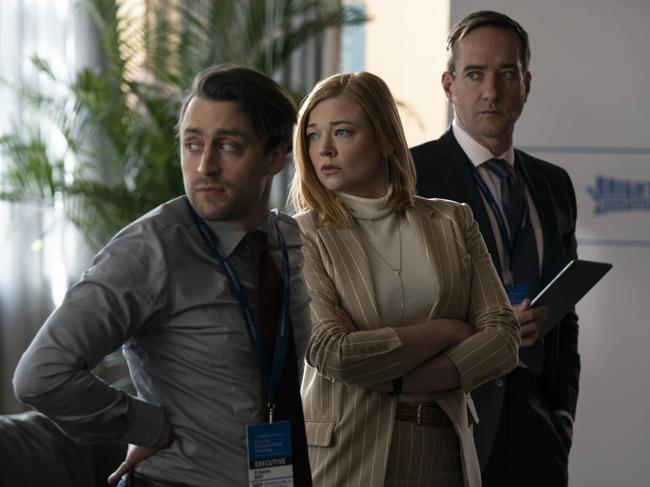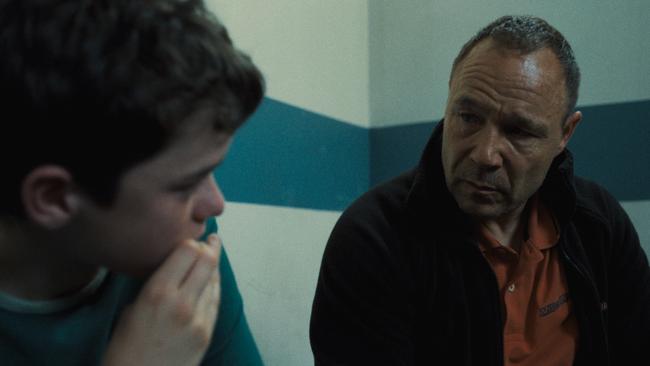From Succession to schadenfreude: Why we love the misfortunes of others
From Succession to Adolescence, stories focused on dysfunctional family dynamics are trending. To Sara Foster, whose top-selling novels have been optioned for TV, it’s a speciality subject.

Entertainment
Don't miss out on the headlines from Entertainment. Followed categories will be added to My News.
It’s clear from the constant, chart-topping flow of family-centric books and TV megahits that we’re all eternally fascinated by the dysfunctional dynamics of our most intimate relationships.
Whether it’s in screen favourites like Succession and The White Lotus, or Liane Moriarty’s compelling novels and their TV adaptations, there’s something deep, dark and delicious about stories that scrape away the veneer of glossy, polished family lives to reveal the scarred landscape of unhinged complexity that invariably lies beneath the surface.
Perhaps we feel less alone when seeing such relationships portrayed as an unavoidably messy and murky business, particularly now the warped societal mirror of social media allows everyone to manufacture moments and make them appear genuine – resulting in everything seeming slightly suspect and unpalatable.
Or are we partaking in a form of cultural schadenfreude, grateful that however complex our lives are, the tortured souls on pages and screens are usually facing tougher or more outrageous circumstances? Maybe these stories simply allow us to step back and find levity and intrigue in familial problems that are, for once, thankfully, not our own.

Many of us invest a gargantuan amount of time and energy into our closest relationships, resulting in a kaleidoscopic array of emotions. I’ve spent my entire writing career exploring the personal impact of complex family dynamics, and how these manifest in different ways throughout our lives.
In my latest novel, When She Was Gone, a young au pair goes missing from a remote Australian beach along with the two children under her care, while working for a powerful Australian family. The high-profile investigation that follows brings together a decorated, ageing police officer forced to confront his life choices, a determined mother who’s been kept apart from her child, and a wealthy family with a skewed sense of righteousness – each with their own distinct ideas on how to bring the missing trio home.
I love working on such multilayered characters and scenarios, because in fiction we can confront hard, complex truths, ask difficult questions around relationships and explore the expectations we hold for ourselves and others.
An increasing number of ‘domestic noir’ novels are being snapped up by TV producers, who recognise their perennial themes, and some of my own books are under option too. As a result of this collective intrigue, we’re seeing more innovative and powerful explorations of family dynamics on screen.

In Netflix’s recent series Adolescence, after a thirteen-year-old boy commits a horrific crime, his parents appear to bear a disproportionate sense of blame, even though their child is clearly at the mercy of the all-pervasive, destructive power of 24/7 social media. The story will send shivers down any parent’s spine, and echoes themes found in Ashley Audrain’s hit novel The Push, where a mother suspects her young daughter is a sociopath.
Other stories look more at situational nuance rather than terrifying darkness when tackling complex family bonds. TV series like Maid (Netflix) and Little Fires Everywhere (based on the novel by Celeste Ng) ask complex questions around social stratas and identity, and how this impacts relationships between parents and children. Importantly, they also consider when we need to safeguard ourselves, even if it means turning away from those we love.
In real life, families can bring everything from all-consuming chaos to celebration. And yet we devour fictionalised versions too, perhaps because they offer something different and yet equally vital: a place for us to meet characters of every variation, and a safe space for comparing, contrasting, recognising and enjoying what we find there, without any blowback on ourselves.


When She Was Gone by Sara Foster is out now, published by HarperCollins.
What are the best, worst and most gripping examples of family relationships in fiction? Join the discussion at THE SUNDAY BOOK CLUB on Facebook.
More Coverage
Originally published as From Succession to schadenfreude: Why we love the misfortunes of others




